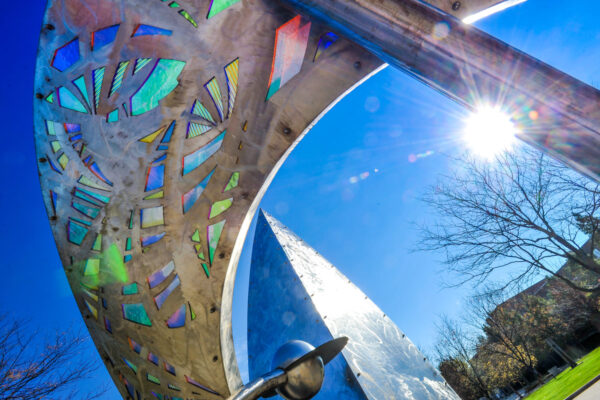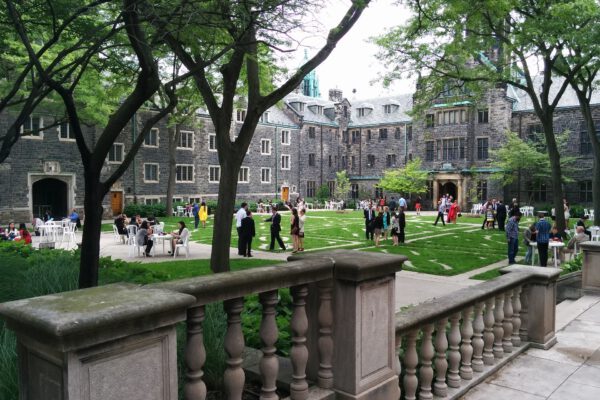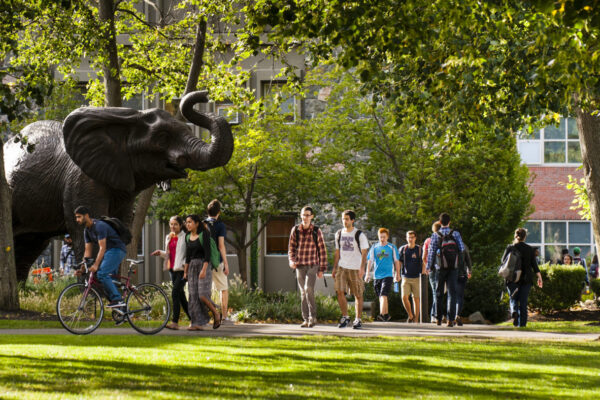
ACE2017, the Council’s 99th Annual Meeting, wrapped up on Tuesday, March 14 in Washington, DC. Along with leadership in a changing world, the meeting also addressed issues related to higher education leadership, equity and social justice, and innovation, and ACE staff have posted blogs covering a selection of these sessions and events. Also included is a selection of videos from ACE2017 plenary sessions.
Higher Education in the Balance: What Does Society Want from Colleges and Universities?
MIT Media Lab Director Joi Ito: How to Survive Our Faster Future
Diversity Is Not Enough. Inclusion Is the Key.
Inclusion, simply stated, is about a sense of belonging that one or a group of individuals feels when able to participate in the majority culture on campus as valued members. This was the focus of the ACE/NADOHE Joint Session at ACE2017 entitled “Campus Leaders Creating Healthy Campus Climates.” How do we create environments where all students, faculty, and administrators feel welcomed and included at our institutions? [read more]
A Conversation on Globalization and Innovation: Best Practices for the Higher Education Community
The relationship between globalization and innovation is complex, timely, and certainly critical given the dynamic landscape for teaching and learning in the 21st century. During ACE2017, the session “Does Innovation Boost Global Perspectives?” hosted by the ACE Council of Fellows, tackled the relationship between these two important concepts. [read more]
Advancing Women Leaders in the New Political Environment
“The role of [a] college president is to be a bridge builder.” This statement by President Yves Salomon-Fernandez of Cumberland County College in New Jersey, made during a session about advancing women’s leadership that focused on the current political climate on campuses, elaborates the need to bring everyone together to work in the best interests of our nation. [read more]
Achieving Gender Equality on Campus
Listing the accomplishments of the top research university he leads, Stony Brook University (NY) President Samuel Stanley Jr. is most proud of one thing: Stony Brook is one of two North American universities part of the 10 worldwide University Impact Champions of the HeForShe movement. The movement and the quest for gender parity on college campuses was the topic of the ACE2017 session, “Evolving Gender Equality in Higher Education: University Champions and the United Nations HeForShe Movement.” [read more]
Finding Common Ground: Campus Inclusion and Free Speech
Free speech is playing out in new ways on American campuses, which some argue is leading to the corrosion of higher education as a marketplace of ideas. Framed by PEN America’s recent report, And Campus for All: Diversity, Inclusion, and Free Speech at US Universities, a Monday afternoon session at ACE2017 moderated by ACE’s Lorelle L. Espinosa focused on the dual tension of free expression and inclusion on American campuses. [read more]
Revamping the Presidential Toolkit Is a Collective Effort
On the final day of ACE2017, Lynn Gangone, vice president for ACE Leadership, Josh Wyner, vice president and executive director of the Aspen Institute’s College Excellence Program, and higher education author and columnist Jeff Selingo joined me for a conversation about the skills and competencies college and university presidents need to successfully lead their institutions in today’s day and age. [read more]
How Higher Education Leaders Are Making Great Teaching A Priority On Their Campuses
How can institutions ensure that effective instruction is a key component of their student success plans? That question was at the center of a lively discussion at ACE2017 on Sunday afternoon. In the concurrent session “Great Teaching Is No Longer Optional,” college and university leaders shared fresh insights on how they are implementing new programs designed to improve instruction on their campuses. [read more]
Intercollegiate Athletics and Academic Integrity: The Importance of Ensuring a Culture of Integrity
The panelists at Monday morning’s ACE2017 session on intercollegiate athletics and academic integrity all came at the topic from different roles and professional backgrounds at their respective higher education institutions. But they all emphasized the importance of ensuring a culture of integrity in intercollegiate athletics—across all levels of competition—and providing student-athletes with every opportunity to be students first and foremost. [read more]
Deep Economic Development: Partnerships That Are Reshaping Universities and Their Communities
In an ACE2017 panel moderated by ACE’s Louis Soares, presidents Jim Clements (Clemson University) and Gail Mellow (LaGuardia Community College) and Vice President for Economic Development James Woodell (Association of Public and Land-grant Universities) shared insights into the role higher education plays in economic development as well as information on partnerships their institutions have undertaken in recent years. [read more]
American College Application Campaign: Working with Higher Education Leaders to Promote Access and Completion
During the ACE2017 session on “American College Application Campaign: Working with Higher Education Leaders to Promote Access and Completion,” attendees heard from key leaders of Delaware’s college application campaign, Delaware College Application Month. [read more]
Diverse Faculty for Diverse Students: How Two Leaders Are Transforming Their Approach
As a Latino and an equity-minded scholar, I often find myself engaged in conversations and attending conference sessions on topics of diversity with other people of color. This is often the case whether I’m at a scholarly conference or most recently at ACE2017, a conference for senior-level administrators including chancellors, presidents, provosts and chief academic officers and deans. [read more]
Connections Between Instructional Quality, Student Outcomes and Institutional Finances
During a packed Sunday morning session at ACE2017, three panelists discussed the critical connections between effective classroom instruction, improved student outcomes and institutional efficiency. The session was part of a collaboration between ACE and Strada Education Network to produce research, white papers and a quality framework on the topic. [read more]
A Global Conversation on Student Success
Leaders of higher education institutions and associations in Canada, Mexico, United Kingdom and the United States shared notes on plans to increase postsecondary education attainment at an ACE2017 panel session Monday, March 13, sponsored by the Lumina Foundation. [read more]
In Higher Education, U.S.-Mexico Relations Are Strong
Findings from a recent ACE study of U.S.-Mexico higher education ties were announced by Arturo Cherbowski Lask, executive director of Santander Universidades and general director of Universia México. At a dinner hosted by ACE president Molly Corbett Broad during ACE2017, ACE’s 99th Annual Meeting in Washington, DC, Cherbowski said the project set out to inventory “ground-level” activity resulting from several high-level initiatives between the two countries. [read more]
UVA President Teresa Sullivan Discusses Campus Free Speech in ACE2017 Atwell Plenary
Racial Diversity Is More Than Just Demographic Representation
In recent years, students on college and university campuses across the nation have held protests calling for more racially inclusive campus climates. The ACE2017 session “Dialogue and Action: Presidential Leadership on Race,” moderated by William B. Harvey of the American Association for Access, Equity, and Diversity, sought to explore presidential perspectives from three panelists—Ronald Crutcher (University of Richmond, VA), Brit Kirwan (University System of Maryland), and Tuajuanda Jordan (Saint Mary’s College of Maryland)—on race relations on campuses and how institutions can improve them. [read more]
Freedom of Expression Requires Safe Spaces
Tensions on campuses are increasingly building around the creation of an inclusive, safe space for students and freedom of speech for all. How can we come together in productive civic dialogue where we can learn from our differences and these spaces for all students to share their perspectives, identities and backgrounds? Panelists at the ACE2017 session “Freedom of Expression and Safe Spaces” explored these issues and more. [read more]
Ready to Work: Employability and Higher Education
Growing skepticism about the benefits of higher education degrees and questions about whether credentials turn into a job, or whether credentials fuel a career, sparked conversation at the ACE2017 session “Employability and Higher Education.” Panelists articulated how colleges and universities identify best practices for promoting student success and workforce outcomes through data-driven job market analyses. [read more]
How Can We Better Communicate the Meaning of New Credentials?
As postsecondary education becomes more complex and the number of credentials, badges, certificates and degrees increases, there is a growing need to understand the hows and whys of the available options. A Sunday morning session at ACE2017 looked at the work of Credential Engine, a nonprofit organization established to create an open-source registry to help stakeholders share information about credentials, as well as more broadly at what’s driving the need for credentials in higher education. [read more]
Leaders’ Perspectives: Using Data to Drive Student Success
Higher education institutions are dedicated to helping students achieve their academic and life goals. But with the graduation rate for full-time students hovering around 60 percent, higher education institutions need to find new and innovative ways to measure and understand which student success initiatives really work to help students achieve their full potential. During the ACE2017 session, “Using Data to Drive Student Success,” four panelists shared their own experiences in utilizing data to identify best practices across campuses, engage faculty and staff and improve student success. [read more]
USF System President Judy Genshaft Urges Women to Keep Climbing at Women’s Leadership Dinner
Never give up, keep climbing and stay focused: Three seemingly simple pieces of advice, but words that are a testament to the many years of dedication to women and higher education by University of South Florida (USF) System President Judy Genshaft. Genshaft received the 2017 Donna Shavlik Award at last night’s Women’s Leadership Dinner at ACE2017. A longtime friend of Donna Shavlik, the former director of ACE’s Office of Women (now part of ACE Leadership), Genshaft said she was honored to receive the award from someone she considers a mentor and a friend from the beginning of her career. [read more]
Innovation Doesn’t Need to be Shrouded in Secrecy
How do you bridge the realities facing your institution with the real need for a future vision? Such was the question posed by Rick Staisloff, principal of RPK Group, to a group of college and university presidents at ACE2017. Innovation has to be based on a future vision, buy-in, the right incentives, sound implementation, data and evidence, and a focus on student success. By doing these things, many colleges and universities could find themselves in a much different—and better place—in the coming years. [read more]
If you have any questions or comments about this blog post, please contact us.


